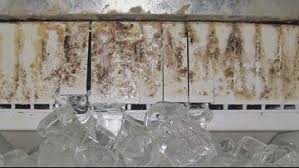Ice Machines
Did You Know? The Dirtiest Piece of Equipment in Your Kitchen Might be Your Ice Machine!

70% of ice machine service calls are due to water-related problems. When your ice is bad, your beverages suffer. Proper routine maintenance and descaling ensure your machine has a normal and problem-free lifespan.
Many commercial kitchens unintentionally have the mentality of “out of sight, out of mind” when it comes to sanitation and water filter replacement for their ice machines. Believe it or not, ice machines are a breeding ground for salmonella, E. coli, and legionella bacteria as well as mold, yeast, and slime. Not only is it important to maintain a clean ice machine for the health of your customers, but it also helps your machine to run better and last longer.
There are three basic steps to maintaining your commercial ice machine:
- Clean/De-Scale
- Replace Water Filters
- Sanitize
Both the evaporator where the ice is formed and the bin where the ice is stored dictate the quality and efficiency of how well an ice machine performs. They are prone to scale, corrosion, and microbial growth. Neglecting to clean and sanitize an ice machine can result in poor quality, cloudy ice. This leads to decreased ice production and more frequent equipment downtime.
How many times a year should you clean your commercial ice machine?
Depending on your water quality, twice a year is the minimum for most commercial kitchens. If you have hard water, consider cleaning your commercial ice machine more frequently. Because bacteria and mold can build up in places that you are unable to see without taking the unit apart, we highly recommend hiring a commercial repair company to service your equipment at least twice a year. Regardless of your cleaning schedule, you should periodically empty and clean ice storage bins. Also, in foodservice kitchens where an ice machine shares a room with empty beer bottles, breading stations or dough machines, it can all but ensure mold and microbial growth.
How does Legionella bacterium, which typically grows in warm water, grow in cold water used in the ice machine?
The water reservoir in an ice machine is located next to a compressor, which in turn can heat up the water reservoir enough to allow the growth of Legionella. Without a proper filter and routine maintenance, Legionella bacteria and many other types of microbial growth can thrive.
What is the correct way to scoop the ice out of an ice machine?
Remember to always use a designated scoop when removing ice from the machine. Avoid using bare hands or a glass. When the ice scoop is not in use, store it in an enclosed compartment. Both the scoop and compartment should be cleaned regularly, just as you would with any other food contact surfaces.
Should you clean the exterior of the ice machine?
Bacteria can also collect and migrate into your ice machine from an exterior surface. Try to clean the outside of your unit on a regular basis, about 2-3 times a month.
Why should you filter water for your ice machine?
OptiPure Ice Filters enhance the quality and flavor of the ice in your commercial ice machine. An ice filtration system removes chlorine, particulate, and other contaminants that may make your ice appear cloudy. Hard water also creates scale, which can wreak havoc on the inner components of your ice maker.
Our Optipure recommendations:
OptiPure BWS100/5 Blended Water System

- Includes: Integrated pre-filter and post-filter, 5-gallon storage tank, tubing and fittings for installation.
- Can be wall mounted
- Reduces scale and corrosion associated with TDS, hard water, and chlorides.
OptiPure FXI-22P Water Treatment System

- Reduces sediment down to 0.5 microns.
- Reduces chlorine taste & odor at a flow rate of 6.0 GPM for 60,000 gallons.
- Reduces maintenance frequency and cost, and extends equipment life.
- Includes IsoNet technology to protect equipment.
- Gradient-density sediment filtration protects against dirt, rust, and other debris down to 0.5 microns.
OptiPure CTOS-CK10 Cartridge

- IsoNet® – OptiPure’s patented scale inhibiting technology delivers up to 5 times more protection against scale and corrosion than most 8000 series cartridges.
- Improves the quality and consistency of cold and hot beverages.
- Gradient-density sediment filtration protects against dirt, rust and other debris down to 0.5 microns.
